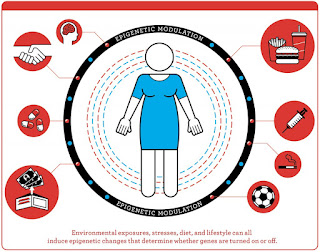[BIOLOGY | Week #2] "Evo-Devo" Reflection + Sleep Cycle Findings
"Evo-Devo" + Epigenetics
If our environment has a direct correlation to gene development, then I'm curious to learn more about epigentics (a branch of evo-devo) and transgenerational inherited trauma. Epigenetic researchers who focus on the genetic transmission of trauma look at historical trauma (i.e. slavery or the Holocaust), post-traumatic stress disorder (PTSD) and how it is passed down through family genes, affecting varying aspects of their offsprings livelihood. This can impact the future generation's life expectancy, resiliency to diseases and capacity to respond to stressors. I also think about the implications this has on the physical and mental health of descendants of colonized and displaced people.
Although most studies on epigenetics are on descendants of survivors of traumatic events that happened decades ago, t, I think about the individuals today who are constantly re-exposed to their traumatic environments such as those living in Palestine and Sudan. Even our young people in the United States that live in a time where gun-violence is prevalent in their own school campuses, night clubs and workplaces. How much of their genes have been altered because of their traumatic experiences? Will we see a manifestation of those outcomes in future epigenetic studies? There was an article published in 2011 by The Guardian that highlights a study done on survivors of the 9/11 attack in NY who were pregnant and the transmission of PTSD from the attack. I'm interested to see more recent studies similar to this one.
The study of epigenetics is still fairly new, but there continues to be extensive data on how trauma can be transmitted through generations from both sociological and laboratory researchers. I found this article on inherited trauma from the NY Times and Dr. Joy DeGruy's study on Post-Traumatic Slave Syndrome (a sociological view on epigenetics and inherited trauma) quite interesting.
Sleep Cycle Findings
Rebuilding my relationship to sleep has become a life-long practice. My goal is to begin my sleep routine at least two hours before bed. I aim to to get a minimum of 7.5 hours of sleep, no (cell phone) screen time with my phone plugged in across the room, and to practice 15 minutes of stationary sitting meditation before closing my eyes. Unfortunately, all of those goals have been thrown out the window since starting acupuncture school, but I am actively trying to be better.
I have an app on my cell phone that provides my sleep analysis. This past week, I have spent an average 6 1/2 hours in bed. I had trouble falling asleep and getting settled because I was traveling last weekend. I usually get up once or twice in the middle of the night to use the bathroom. I'm also a light sleeper, so use a blindfold and earplugs. What impacts my sleep quality the most is my cell phone use. (Duh!) I find that if I am on my cell phone right before bed, it takes longer for me to fall sleep. I feel compelled to do another study this week that reflects my intended sleep routine and see how it compares to this past week's outcome.
If our environment has a direct correlation to gene development, then I'm curious to learn more about epigentics (a branch of evo-devo) and transgenerational inherited trauma. Epigenetic researchers who focus on the genetic transmission of trauma look at historical trauma (i.e. slavery or the Holocaust), post-traumatic stress disorder (PTSD) and how it is passed down through family genes, affecting varying aspects of their offsprings livelihood. This can impact the future generation's life expectancy, resiliency to diseases and capacity to respond to stressors. I also think about the implications this has on the physical and mental health of descendants of colonized and displaced people.
Although most studies on epigenetics are on descendants of survivors of traumatic events that happened decades ago, t, I think about the individuals today who are constantly re-exposed to their traumatic environments such as those living in Palestine and Sudan. Even our young people in the United States that live in a time where gun-violence is prevalent in their own school campuses, night clubs and workplaces. How much of their genes have been altered because of their traumatic experiences? Will we see a manifestation of those outcomes in future epigenetic studies? There was an article published in 2011 by The Guardian that highlights a study done on survivors of the 9/11 attack in NY who were pregnant and the transmission of PTSD from the attack. I'm interested to see more recent studies similar to this one.
The study of epigenetics is still fairly new, but there continues to be extensive data on how trauma can be transmitted through generations from both sociological and laboratory researchers. I found this article on inherited trauma from the NY Times and Dr. Joy DeGruy's study on Post-Traumatic Slave Syndrome (a sociological view on epigenetics and inherited trauma) quite interesting.
Sleep Cycle Findings
Rebuilding my relationship to sleep has become a life-long practice. My goal is to begin my sleep routine at least two hours before bed. I aim to to get a minimum of 7.5 hours of sleep, no (cell phone) screen time with my phone plugged in across the room, and to practice 15 minutes of stationary sitting meditation before closing my eyes. Unfortunately, all of those goals have been thrown out the window since starting acupuncture school, but I am actively trying to be better.
I have an app on my cell phone that provides my sleep analysis. This past week, I have spent an average 6 1/2 hours in bed. I had trouble falling asleep and getting settled because I was traveling last weekend. I usually get up once or twice in the middle of the night to use the bathroom. I'm also a light sleeper, so use a blindfold and earplugs. What impacts my sleep quality the most is my cell phone use. (Duh!) I find that if I am on my cell phone right before bed, it takes longer for me to fall sleep. I feel compelled to do another study this week that reflects my intended sleep routine and see how it compares to this past week's outcome.




Comments
Post a Comment